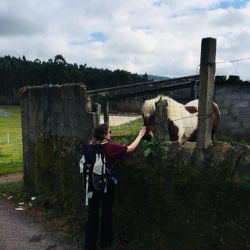The Universality of Adolescence
I’m going to assume that most people reading this blog have not seen or heard of the movie 8th Grade (Bo Burnham’s directorial debut) for two reasons: the Indie movie had a limited release in select theaters and, let’s be real, most people are not particularly enthusiastic about delving back into their most awkward years of adolescence. However, unlike most people, I was intrigued to make the trek to the theaters; I anticipated and welcomed the inevitable nostalgia. To be reminded of the years when my face was puckered with pimples and my frizzy hair suffered from days of being pulled back into a tight ponytail… it doesn’t get better than that. So, I saw the movie. And although the movie was shut out of the Academy Awards, it was my favorite movie of this year.

Why was it my favorite? Well, the awkwardness of adolescence is something everyone can relate to. The cringe-worthy flirtations, the over-excessively flat-ironed hair, the desire to conform to the masses. Every person who has attended school in America has had to endure at least some form of this awkwardness (see below me in my prime: crimped hair, flash-photography in-the-mirror-selfie, pursed lips and furrowed eyebrows). What I didn’t know is that this embarrassment transcends oceans. Now that I have come to Spain, I see that these experiences perpetuate internationally. Why I thought teenagers in Spain would be any different from teenagers in the United States is beyond me. They, like students in America, are just trying their best to confront the most tumultuous years of their existence.

Some similarities between Spanish schools and American schools: there are cliques. There are groups of students who love school, and groups that don’t care, and groups who are unsure of what to think. There are students who sneak their phones in class, and students who probably leave their phones at home. Some students doze off in class, while others seem to have strings attached to the back of their wrists, lifting their hands above their heads as if their parents were puppeteers forcing them to participate. But the most apparent similarity between students in Spain and students in the United States is their ever present curiosity for someone new and different.
And this is where I come into the story.
I’ve been working with students since I was old enough to have acquired enough knowledge to share. Throughout all of my experiences, students always seem to lose a grasp on reality when someone new comes into the classroom-- especially if that person is “foreign” to their daily lifestyle. My initial assumption in regards to what would happen when I arrived to Spain was that students would probably show some curiosity regarding the American trotting around their school. But I had no idea that the students would welcome me so warmly.
I enter the school each day, navigate my way through the labyrinth of hallways (my favorite picture belowed) and am bombarded with “hellos” from students; hands enthusiastically wave in my direction. During one of my first classes, a student waited until after the bell to declare, “Cami, I love you!” before running out of the room. In another class, a different student asked me in English, “Why are you so beautiful?” In my most recent class, I entered the room only to receive a collective “Hello, Cami” from the students. It is inexplicably moving when students are enthusiastic after realizing I will be in their classrooms for the day.
Given the mutual excitement exchanged between myself and the students (an excitement I hope will perpetuate over the duration of my stay in Spain), I am optimistic that I can impart some of my knowledge onto them. The title “Language and Culture Assistant” isn’t a title I would personally choose to partner with my position here in the school. Rather, I would call myself a “mediator,” a “helper,” or even just a “friend.” Most of what these students want to know about what my life is like in the United States concerns whether or not I voted for Donald Trump and… Well, that’s pretty much it. Besides inquiring about my political affiliations, the students shy away from asking me questions about my life in the United States. And that’s okay. When I was their age, I was too shy to even speak to English-speaking college students. I believe that maybe my job here is to just help students find ways to best maneuver the most chaotic years of their lives (while also teaching them English, of course). Or maybe that is just what I need to be doing right now, and in the next few weeks that will all change.
Regardless, here I am in a secondary school in Spain, thrown into the lion’s den of my youth. And in complete honesty, I absolutely love it.
Related Posts

Who Runs the World? Pharaohs.
Running the Pyramids Half Marathon in Cairo, Egypt Egypt and a half marathon? Let’s run it back—literally. I had the opportunity to travel to Cairo, Egypt, to run the annual... keep reading

Copenhagen Cosplays the North Pole
A Winter Weekend Guide If you’re searching for the perfect winter weekend getaway while studying abroad, Copenhagen deserves a spot at the top of your list. While the city is... keep reading

Let’s Moroccan Roll
A 4-Day Morocco Getaway from Madrid Morocco has become an increasingly popular destination for students studying and working abroad, and after spending four days there, it’s easy to see why... keep reading

